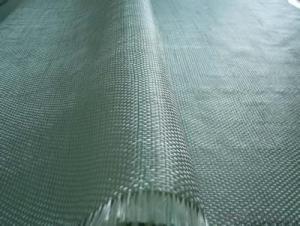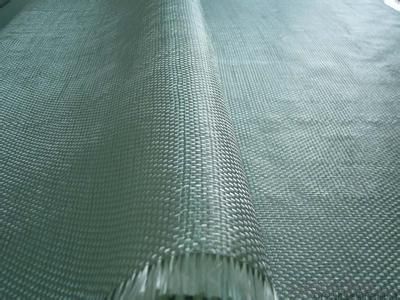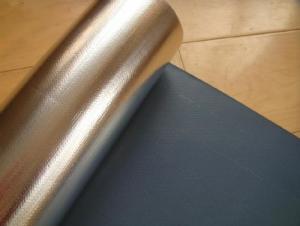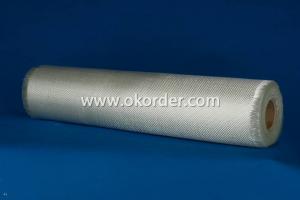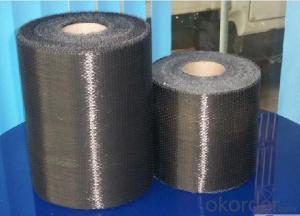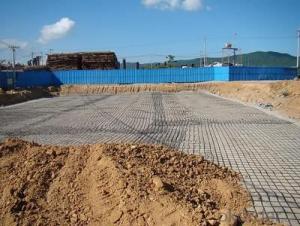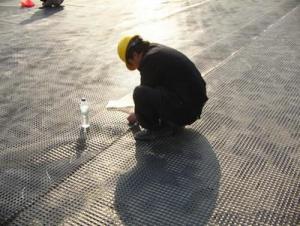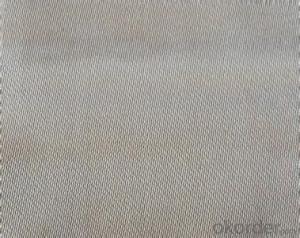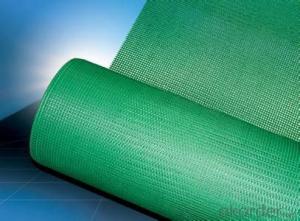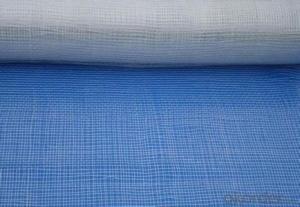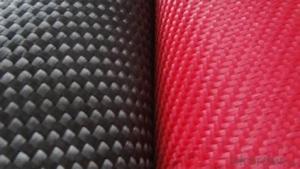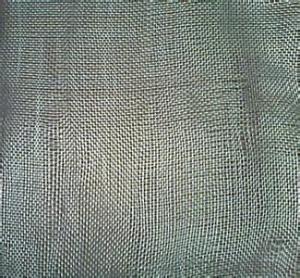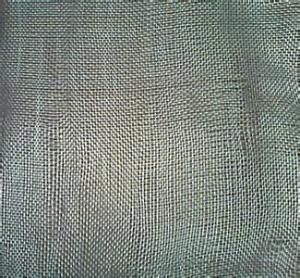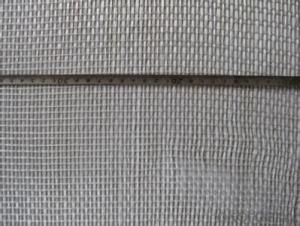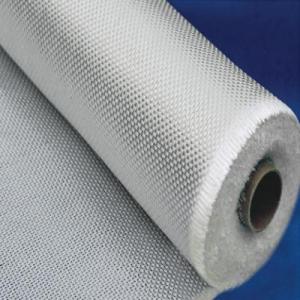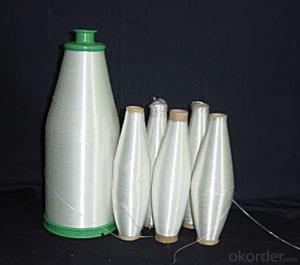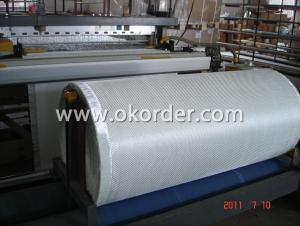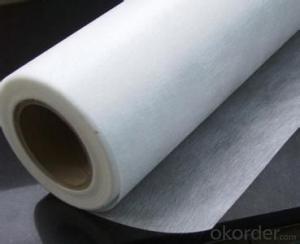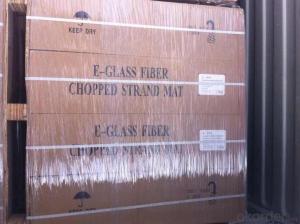High Temperature Silica Cloth CC Fiberglass Fabrics
- Loading Port:
- China Main Port
- Payment Terms:
- TT OR LC
- Min Order Qty:
- -
- Supply Capability:
- -
OKorder Service Pledge
Quality Product, Order Online Tracking, Timely Delivery
OKorder Financial Service
Credit Rating, Credit Services, Credit Purchasing
You Might Also Like
Product characteristics:
1.Good chemical stability;
2.good insulating property;
3.Good high-temperature resistance,acid resistance and erode resistance;
4.Low shrinkage and thermal conductiveity.
Product Features:
Warp and weft roving aligned in a parallel and flat manner, resulting in uniform tension.
Densely aligned fibers, resulting in high dimensional stability and making handing easy.
Good mold ability, fast and complete wet in resins, resulting in high productivity.
Good transparency and high strength of composite products.
Even thickness and flawless,low fuzz;
Easy wet out and fast impregnating;
Properties guaranteed under moisture conditon;
Excellent mechanical strength during production of finished product.
Warp and weft roving aligned in a parallel and flat manner, resulting in uniform tension.
Densely aligned fibers, resulting in high dimensional stability and making handing easy.
Good mold ability, fast and complete wet in resins, resulting in high productivity.
Good transparency and high strength of composite products.
Even thickness and flawless,low fuzz;
Easy wet out and fast impregnating;
Properties guaranteed under moisture conditon;
Excellent mechanical strength during production of finished product.
Main specification: 3788, 3784 , 3786
Content of the SiO2 >/= 96%
High Silica Fabric
1.Material : high silica fiber glass
2.Working Temperature: 1100 C
3.Fire Proof Cloth/Fabric
- Q: Can fiberglass fabric be used for heat-resistant gloves?
- Indeed, heat-resistant gloves can utilize fiberglass fabric. Fiberglass possesses exceptional heat resistance characteristics, rendering it an optimal substance for gloves employed in high-temperature settings. This fabric exhibits the capacity to endure extreme heat without succumbing to ignition or melting. Moreover, fiberglass fabric boasts a lightweight and pliable nature, enabling comfortable usage while simultaneously providing defense against heat-related hazards. However, it is crucial to recognize that gloves constructed from fiberglass fabric may not be appropriate for handling open flames or direct contact with heated surfaces due to the material's potential for heat transfer via conduction. Consequently, it is advisable to opt for gloves specially designed for the intended heat application.
- Q: Are there any specific fire-resistant properties associated with fiberglass fabrics?
- Fiberglass fabrics possess specific fire-resistant qualities. Their fire resistance stems from the combination of glass fibers and resin used in their composition. The glass fibers in fiberglass fabrics exhibit no tendencies to burn, melt, or release toxic fumes when confronted with flames or intense heat. Consequently, fiberglass fabrics exhibit exceptional resistance to ignition and combustion. Moreover, these fabrics possess a high ignition temperature, necessitating higher temperatures for them to catch fire compared to other materials. Furthermore, their low heat conductivity ensures that they do not easily transfer heat, further augmenting their fire-resistant attributes. Consequently, fiberglass fabrics find widespread use in various applications that prioritize fire safety, including protective clothing, curtains, insulation materials, and the construction of fire-resistant structures.
- Q: Can fiberglass fabric be used for reinforcement in aerospace components?
- Yes, fiberglass fabric can be used for reinforcement in aerospace components. Fiberglass is a lightweight and strong material that has been widely used in the aerospace industry for many years. It is known for its excellent mechanical properties, including high tensile strength and stiffness, as well as its resistance to corrosion and fatigue. These properties make fiberglass fabric an ideal choice for reinforcing aerospace components such as fuselages, wings, and structural components. Additionally, fiberglass fabric can be easily molded into complex shapes, allowing for greater design flexibility in aerospace applications. Overall, fiberglass fabric is a reliable and cost-effective reinforcement material in the aerospace industry.
- Q: What are the different fiberglass fabric finishes for antistatic properties?
- There are several different fiberglass fabric finishes that can be applied to provide antistatic properties. These finishes are designed to reduce or eliminate the buildup of static electricity on the fabric surface, which can be important in various industries such as electronics, automotive, and aerospace. Some of the commonly used finishes include: 1. Carbon Coating: This finish involves applying a thin layer of carbon particles onto the surface of the fiberglass fabric. The carbon particles create a conductive path, allowing any static charge to dissipate quickly. 2. Conductive Polymer Coating: In this finish, a conductive polymer is applied to the fabric, forming a continuous conductive network. This coating helps to prevent the accumulation of static charges and provides a high level of antistatic protection. 3. Metallic Coating: A thin layer of metal, typically silver or copper, is applied to the fiberglass fabric. The metal coating acts as a conductor, allowing static electricity to flow through it and dissipate harmlessly. 4. Chemical Antistatic Finish: This finish involves the application of a chemical treatment to the fabric surface. These treatments usually contain conductive agents that help to neutralize any static charge buildup. 5. Carbon Fiber Reinforcement: Fiberglass fabric can also be woven with carbon fibers to enhance its antistatic properties. Carbon fibers have inherent conductivity, helping to dissipate static charges effectively. It is important to note that the choice of fiberglass fabric finish for antistatic properties depends on the specific requirements of the application. Factors such as the level of antistatic protection needed, the desired durability, and the intended use of the fabric will influence the selection of the appropriate finish.
- Q: Can fiberglass fabric be used for making curtains or blinds?
- Yes, fiberglass fabric can be used for making curtains or blinds. Fiberglass fabric is a versatile material that offers several advantages for window coverings. Firstly, it is highly durable and resistant to wear and tear, making it suitable for long-lasting curtains or blinds. Additionally, fiberglass fabric is flame-resistant, making it a safe option for window coverings. It is also light in weight, allowing for easy installation and operation. Moreover, fiberglass fabric is available in a wide range of colors and designs, offering flexibility in terms of aesthetics and matching the décor of a room. Lastly, it provides excellent light control and privacy, making it an ideal choice for curtains or blinds. Overall, fiberglass fabric is a practical and functional option for making curtains or blinds.
- Q: Can fiberglass fabric be used for electrical cables?
- Indeed, electrical cables can make use of fiberglass fabric. Renowned for its exceptional electrical insulation capabilities, fiberglass fabric is well-suited for scenarios necessitating the reduction of electrical conductivity. It can serve as a protective outer layer or insulation within electrical cables, effectively safeguarding against electrical shocks and short circuits. Moreover, fiberglass fabric's resistance to heat, fire, and chemicals amplifies its suitability for electrical cable applications.
- Q: What are the different fiberglass fabric coatings for flame retardancy?
- Some common fiberglass fabric coatings for flame retardancy include silicone, acrylic, and polyurethane. These coatings are applied to the fabric to enhance its resistance to flames and prevent it from igniting or spreading fire.
- Q: What is the weight of fiberglass fabric?
- The weight of fiberglass fabric may differ based on the particular type and thickness of the fabric. Typically, fiberglass fabric is quantified in ounces per square yard (oz/yd2) or grams per square meter (g/m2). Fiberglass fabric is typically available in weights ranging from 0.5 oz/yd2 (17 g/m2) to 3.0 oz/yd2 (102 g/m2) or beyond. Lightweight fiberglass fabrics are often employed in applications like reinforcement and lamination, whereas heavier fabrics find common use in structural reinforcement or insulation objectives.
- Q: How does fiberglass fabric handle moisture and humidity?
- Due to its inherent properties, fiberglass fabric exhibits high resistance to moisture and humidity. Unlike cotton or wool, which are natural fibers, fiberglass is hydrophobic and repels water, preventing it from readily absorbing moisture. Consequently, this quality enables the fabric to effectively resist the growth of mold and mildew, rendering it suitable for use in environments with high humidity. Moreover, fiberglass fabric does not retain moisture, thus avoiding any increase in weight or sagging when exposed to water or high humidity. This particular characteristic proves especially advantageous in situations where the fabric needs to maintain its strength and shape despite being subjected to moisture. Furthermore, fiberglass fabric is renowned for its dimensional stability, meaning it does not undergo significant expansion or contraction when the humidity levels change. This stability guarantees that the fabric maintains its original shape and size regardless of the varying moisture conditions, making it a dependable choice for applications that require consistent performance. Overall, the resistance of fiberglass fabric to moisture and humidity establishes it as a durable and reliable material suitable for a broad range of applications, including boat covers, outdoor furniture, and industrial insulation.
- Q: Can fiberglass fabric be used for reinforcement in mining tanks?
- Yes, fiberglass fabric can be used for reinforcement in mining tanks. Fiberglass fabric is known for its strength, durability, and corrosion resistance, making it an ideal material for reinforcing structures in harsh environments such as mining tanks. It provides reinforcement to prevent leakage, enhance structural integrity, and withstand the demanding conditions typically found in mining operations.
Send your message to us
High Temperature Silica Cloth CC Fiberglass Fabrics
- Loading Port:
- China Main Port
- Payment Terms:
- TT OR LC
- Min Order Qty:
- -
- Supply Capability:
- -
OKorder Service Pledge
Quality Product, Order Online Tracking, Timely Delivery
OKorder Financial Service
Credit Rating, Credit Services, Credit Purchasing
Similar products
Hot products
Hot Searches
Related keywords
